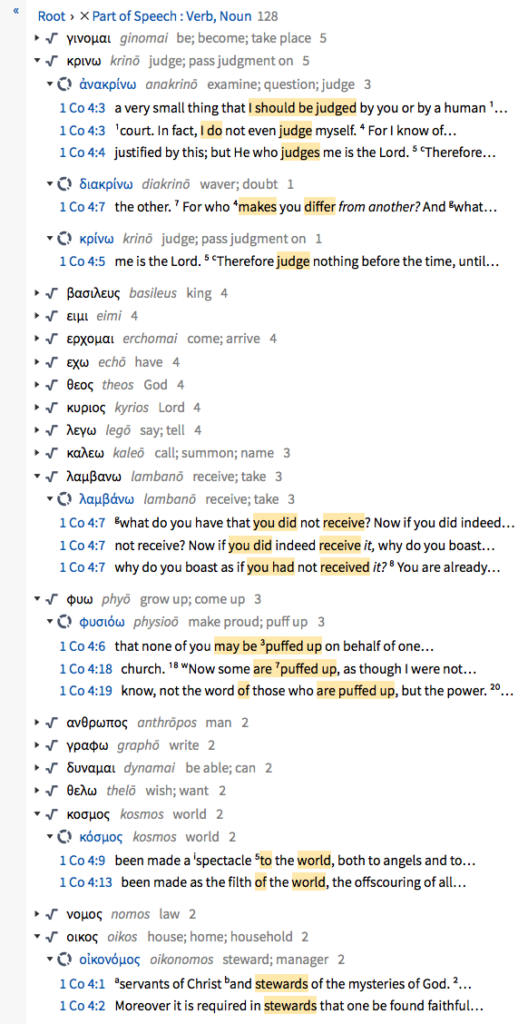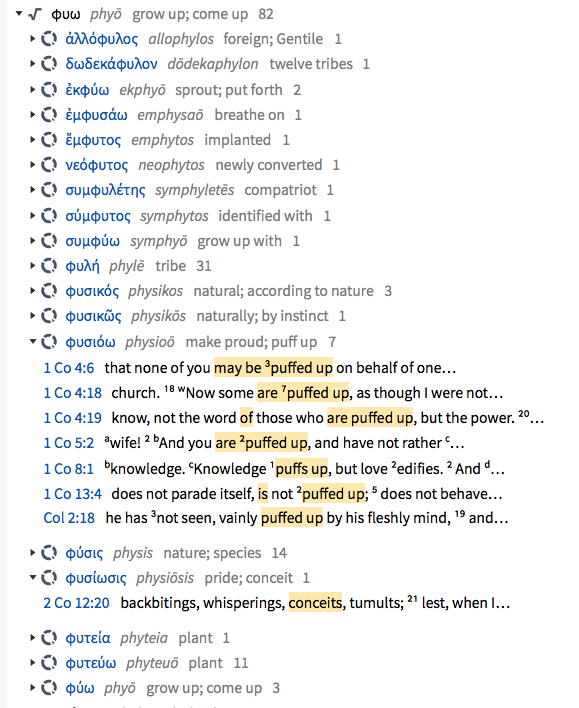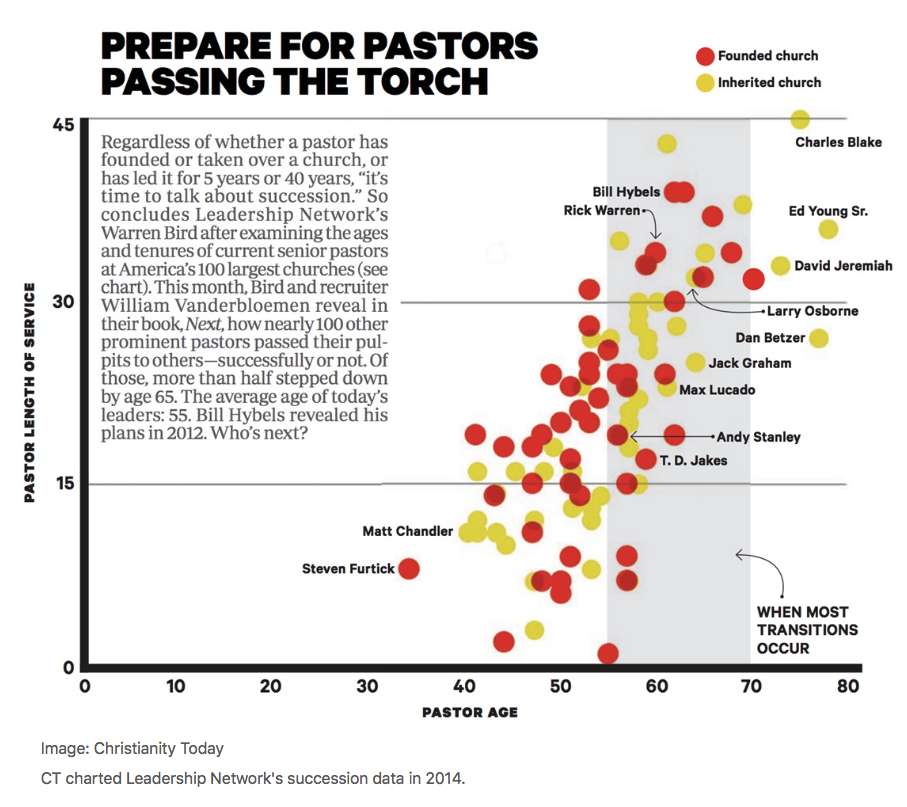Below are resources in support of the study of Chapter 4 of 1 Corinthians
- Below is an interlinear pdf showing the Greek “lemma” and the Strongs G number of such lemma.
1 Cor 4 NKJV - Below are the noun and verb lemmas in order of word frequency, with certain words expanded to show the relevant verse:

- Below are the IMPERATIVE verbs (the “imperative” annotation of certain verbs, generally known as the “mood” of the verb, designates command language).
IMPERATIVE verbs in Chapters 1-3 are here
A general description of the IMPERATIVE is given here: - A special word in the Corinthian Epistles is used for the idea of being “puffed up,” proud, even arrogant: phyo, Strongs G5448. The lemma is expressed in many forms in the NT and in Greek literature including conveying the idea of “nature” or natural matters, and is the source of our English word “physics” which of course is the study of nature. Unlike typical lemmas, we need to carefully consider the form of phyo to understand the meaning of the word in the context it occurs. Below is a list of the forms of phyo as it occurs 82 times in the NT. The two expressions of interest to us are expanded as shown.

Physiosis (a noun) as it occurs in 2 Cor. 12:20 can be defined conceits (as given above), swelled-headedness (a more literal and beautifully figurative expression), arrogance, feeling of self-importance. This form, a noun, can be thought of as a kind of condition diagnosis an M.D. might set you down to tell you: “I have serious news for you…our tests show that you are infected with physiosis.” Is it curable? Perhaps only by God. (As a sidebar excursion, here is a link to hundreds of conditions characterized by the affix [ending] -osis; sadly physiosis, the prevalent disease of fallen men is not included in the list).
Physioo (a verb) means to be proud, haughty, conceited. This is a behavior, stemming from an inner self-belief (physiosis), though the behavior may be an ‘out of character’ occurrence, something like saying something astonishingly stupid without at first realizing it to be such. (We’ve all been there). - One of the great books addressing the universal and Satanic problem of pride (physiosis and physioo) is titled, simply, Humility, by Andrew Murray. It is long out of copyright so there are many free online sources of the book. Amazon’s Kindle has a very usefully formatted edition (that costs a nominal amount). A pdf of Murray’s book is given below:
Andrew Murray on Humility
There are so many great observations from this book. Here are seven of them:
1> “Humility, the place of entire dependence on God, is the first duty and the highest virtue of the creature, and the root of every virtue. And so pride, or the loss of this humility, is the root of every sin and evil.”
2> “Humility is the only soil in which the graces root; the lack of humility is the sufficient explanation of every defect and failure. Humility is not so much a grace or virtue along with others; it is the root of all, because it alone takes the right attitude before God, and allows Him as God to do all.”
3> “Our insight into the need of redemption will largely depend upon our knowledge of the terrible nature of the power that has entered our being.”
4> “The truth is this: Pride must die in you or nothing of heaven can live in you. Under the banner of the truth, give yourself up to the meek and humble spirit of the holy Jesus. Humility must sow the seed or there can be no reaping in heaven. Look not at pride only as an unbecoming temper, nor at humility only as a decent virtue: for the one is death and the other is life; the one is hell and the other is heaven. So much as you have of pride within you, you have of the fallen angel alive in you; so much as you have of true humility, so much you have of the Lamb of God within you.”
5> “when the serpent breathed the poison of his pride, the desire to be as God, into the hearts of our first parents, that they too fell from their high estate into all the wretchedness in which man is now sunk. In heaven and earth, pride, self-exaltation, is the gate and the birth, and the curse, of hell.”
6> “Pride renders faith impossible.”
7> “It is necessary to understand that it is not sin that humbles most, but grace.” - One obvious application of these above issues, and the problem of divisions and men-following in the Corinthian church epistle has to do with titles and more specifically identifying a local group of believers with some titular head who is not Christ. See the below contemporary image for an example (though such image was not prepared for this purpose, it does fit).

- Another application of “puffing up” is as a reward stimulus for the mind /heart of fallen man. Here are five possible such contexts: (1) Arminianism, (2) Prosperity ‘Gospel,’ (3) “Open and Affirming” churches, (4) ‘Temple Building,‘ and (5) Aggrandizing.
In all these examples, the underlying doctrine elevates man and denigrates God; when one goes up, the other necessarily goes down, so to speak.
In 1 Cor. 3 we saw that there is no other foundation that can be (properly) laid except The Lord Jesus Christ, whereas in Ch. 1-4 we see in Corinth they were starting with “man” (and because it is “man” there is always chaos as we fallen humans each have our own leaning to be ‘god’). As John Piper has well said (quoting from memory): “In my natural state I don’t love God; I hate God. Because I want to be God!”
Lest we be quick to convert such application to some ‘them’ category, i.e. here’s another terrible thing we can say about ‘others’ ‘out there,’ let us think about how the sin inclination of “puffing up” applies to ourselves. - Think also of how The Five Solas of the Reformation express the exact opposite of “puffing up” man (and collections of men): “Sola Scriptura” (Scripture Alone); “Sola Gratia” (Grace Alone); “Sola Fide” (Faith Alone); “Solus Christus” (Christ Alone); and “Soli Deo Gloria” (To God Alone Be Glory).
- Judging. Are we called not to judge? Or are we The Judge’s representative here on earth in every situation? In Para. 2 above, we see there are five occurrences of the Gr. krino (the common root for “judge”) in 1 Cor. 4, in vs. 3, 4, 5, and 7. Are these verses commanding us to not ever judge, which is the dominating opinion of our cultural time and place? Here’s a recent article by Greg Koukl from August 2017 Tabletalk on “Judge Not.” Koukl’s brief essay points out the flaws in the common admonition not to judge. But he is not contending that Scripture is wrong when it so says. How do we understand, then, this chapter’s text regarding ‘no krino?’
- One of the central words of the NT, especially with respect to the Gospel of Christ, is the word “Faith” or “Believe.” Both words come from the root Gr. pisteo, G4100. Pisteo in all it forms occurs more than 600 times in the NT, as shown here.
“Faith” in the NT is something much more than intellectual assent, as the devils also have ‘faith’ in the sense of believing of the reality of the Lord Jesus Christ, however incompletely they grasp the Gospel. Faith expresses the ideal of conformity, where from the Latin the prefix “con” here does not mean “against” but “with” as with words like congruent, consecration, etc.. So Faith, as conforming to something outside itself, is the opposite of “deforming” but can be the outcome of “reforming” (as the Reformation accomplished), and relates to the subject of Three Choices.
Thus Faith because it is conforming connects to the adjacent idea of “obedience.” One can think of obedience as being the essential expression of Faith, the evidence that it is Faith in that it is more than intellectual assent by something that shapes the heart and moves the will. There is an absolutely wonderful teaching on obedience by the late Dr. Martyn Lloyd-Jone here. - Faith, and obedience, are in turn dependent upon discernment. Not every claim is reliable, or true, or even honest (we live in a world saturated by deception both willful and foolish, and some of it cunningly / devilishly willful). In 1 Cor. 4 we are called upon not “to judge.” But such command cannot mean not “to discern” as that would conflict with much other Scripture. So, how do we reconcile these two? Hint: look at evidence, not motives, and make no judgment of persons before the time.
- Discernment in turn leads to the question of what human authority is to be claimed and by whom. Put another way, who’s church is “the church” and what humans are responsible for what?
A lot of blood, literally, has been shed on this question. (Do an online search of Pope Boniface VIII regarding his decree in 1302 A.D. of “Unam Sanctam” for one example, and the reign of English Queen known as “Bloody Mary” for another, and, too, the execution in Calvin’s Geneva of Michael Servetus).
Here are three recent essays (Tabletalk, August 2017) on the offices / gifts of Apostles, Prophets, and Evangelists that address certain aspects of this question. I certainly agree with the essays that capital “A” Apostles and capital “P” prophets have ceased since the completion of the writing of Scripture as those callings were eyewitness accounts attended with miraculous confirmation (we are not eyewitnesses, which is what the term “witness” really means nor is any human’s words beyond what the Scriptures teach confirmed by miraculous signs). However we do have people God has gifted and sent with certain capabilities of elucidating the Scriptures which is a reasonable understanding of the words translated as apostle (which means literally “a person sent with a message recorded elsewhere”), prophet (“one who proclaims or carries along with him a message”), and evangelist (“a messenger of good news”); in all such examples “the truth” is solely in the Scriptures, which, like the Bereans in Acts 17:11, we are called upon to examine to see if what is so proclaimed is “true.”.
I don’t think the Scriptures teach that there is a person /office who is “Pastor” or “pastor” (using the term as a standalone noun), especially in any sense as “the pastor.” I cannot find such reference in the NT except for one occurrence (Eph. 4:11) which is a hendiadys with “teacher,” a subject beyond our present scope. Confirm this for yourself by searching any reasonable Bible translation (KJV, NKJV, NASB, NIV, ESV, NET, …) for the word “pastor” or “pastors.” See the list here for all 40 NT occurrences of the root Gr. word for “pastor” (or “shepherd.” You will only find the Ephesians reference and if strictly translated there will be no “and” between “pastors” and “teachers,” as the demarcation between these words is distinctly different in the Gr. that there is with the prior titles on that list in Ephesians 4.
In any case here are the three essays that represent the Ligonier perspective, however succinctly expressed.
_______________________
Ch 5 resources are here: